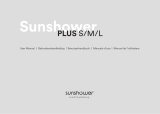
- If you are of skin type V (you rarely get sunburnt, you tan very well and your skin colour is dark
brown) or if you are of skin type VI (you rarely or never get sunburnt and you tan very darkly;
your skin colour is brownish black or darker). In this case you run a high risk of developing skin
reactions, such as discolourations, strong redness or burns, when you use Philips Lumea Essential.
See also chapter ‘Using the appliance’, section ‘Possible side effects and skin reactions’ and
consult the ‘Recommended light intensities table’ in the quick start guide.
- If your natural hair colour in the treatment areas is light blond, white, grey or red. The treatment
will not be effective.
- If you have a skin disease such as active skin cancer, you have a history of skin cancer or any
other localised cancer in the areas to be treated.
- If you have pre-cancerous lesions or multiple atypical moles in the areas to be treated.
- If you have a history of collagen disorder, including a history of keloid scar formation or a history
of poor wound healing.
- If you have a history of vascular disorder, such as the presence of varicose veins or vascular
ectasia in the areas to be treated.
- If your skin is sensitive to light and easily develops a rash or an allergic reaction.
- If you have infections, eczema, burns, inammation of hair follicles, open lacerations, abrasions,
herpes simplex, wounds or lesions and haematomas in the areas to be treated.
- If you have had surgery in the areas to be treated.
- If you have epilepsy with ashlight sensitivity.
- If you have diabetes, lupus erythematodes, porphyria or congestive heart disease.
- If you have any bleeding disorder.
- If you have a history of immunosuppressive disease (including HIV infection or AIDS).
- If your skin is currently being treated with or has recently been treated with Alpha-Hydroxy
Acids (AHAs), Beta- Hydroxy Acids (BHAs), topical isotretinoin and azelaic acid.
- If you have taken any form of isotretinoin such as Accutane
®
or Roaccutane
®
in the last six
months.This treatment can make skin more susceptible to tears, wounds and irritations.
- If you are on painkillers, which reduce the skin’s sensitivity to heat.
- If you are taking photosensitising agents or medications, check the package insert of your
medicine and never use the appliance if it is stated that it can cause photo-allergic reactions,
photo-toxic reactions or if you have to avoid sun when taking this medicine.
- If you take anticoagulation medications, including heavy use of aspirin, in a manner that does not
allow you to stop using them at least one week prior to each treatment with Lumea.
- If you take immunosuppressive medications.
- In the face.
- On nipples, areolas, labia minora, vagina, anus and the inside of the nostrils and ears. See chapter
‘Using the appliance’, section ‘Using the appliance in the bikini area’.
- Men must not use it on the scrotum or face.
- Over or near anything articial like silicone implants, pacemakers, subcutaneous injection ports
(insulin dispenser) or piercings.
- On moles, freckles, large veins, darker pigmented areas, scars or other skin anomalies without
consulting your doctor. This can result in a burn and a change in skin colour, which makes it
potentially harder to identify skin-related diseases (e.g. skin cancer).
- On warts, tattoos or permanent make-up. This can result in a burn and a change in skin colour
(hypopigmentation or hyperpigmentation).
ENGLISH 9















